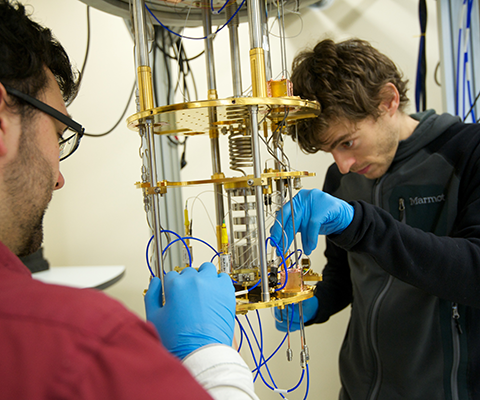How Canadian universities are propelling us towards a quantum future

More than just a buzz word, quantum physics helps us understand matter and energy at its most fundamental level. By understanding the building blocks of life, we can start to unlock new technologies that will revolutionize the way we live.
Undergraduate programs
Due to its advanced nature, there are few undergraduate quantum programs. In most cases, students are introduced to quantum science through a few classes in the undergraduate years but are encouraged to pursue it more deeply during their master’s or PhD studies.
However, three universities in Canada offer students the opportunity to pursue quantum studies at the undergraduate level. Polytechnique Montréal offers a BSc in Engineering Physics with a concentration in quantum engineering, which focuses on developing technologies by applying the laws of quantum mechanics. The University of Manitoba offers quantum and computational chemistry as a focus area for students getting a BSc Major or Honours in Chemistry. At the Université de Sherbrooke, students can obtain a BSc in Quantum Information. The recently introduced program offers a co-op option for students looking to get work experience during their studies.
Graduate studies
There are currently over 25 graduate-level programs at Canadian universities that offer quantum research opportunities. A few of these quantum-related programs stand out for their special offerings.
The University of British Columbia and the University of Toronto both have international quantum programs that allow students to learn from and collaborate with colleagues in European universities. UBC’s International Ph.D. program in Quantum Materials is partnered with the University of Stuttgart, allowing graduate students to learn from professors and researchers in both Canada and Germany. At the University of Toronto, the Erasmus Mundus Joint Master in Quantum Science and Technology is a two-year international program designed in collaboration with three universities in France, Italy and Portugal. Students are required to spend two semesters in foreign countries and are awarded a master’s degree from each of the universities they studied at.
The University of Waterloo offers multidisciplinary graduate programs that allow students to combine studies and research in quantum information with other fields including physics, math, chemistry and engineering. Students in these programs conduct specialized research in over two dozen different areas of quantum information. At the University of Victoria, a training program allows master’s and PhD students in Physics and Astronomy to develop technical expertise in quantum computing hardware and software as well as commercial skills. Courses in the program are taught by faculty from the University of Victoria, Simon Fraser University and The University of British Columbia.
Quantum research institutes and labs
Canada has a dozen research institutes and labs conducting research in quantum-related fields. Some are located within universities, while others work in collaboration with university researchers and the quantum industry.
The University of Calgary’s Institute for Quantum Science and Technology has multiple roles: providing education and training, conducting research and creating links with other research institutes and industrial partners. Its researchers come from multiple disciplines and are working on quantum optics, molecular modeling, nanotechnology and quantum information and computing. In British Columbia, the Silicon Quantum Technology Lab at Simon Fraser University has a narrower research focus. The lab is working on building quantum technology using silicon, which has the potential to help make a quantum computer, secure quantum communication, create quantum sensors and more. At Queen’s University, the Quantum Nanophotonics Lab is currently looking into next-generation telecom quantum sources. With researchers from various disciplines and state-of-the-art equipment, the lab is in the process of designing innovative quantum circuits and nano- and microscale structures that control and shape the flow of light.
Other research institutes and labs are associated with more than one university. The Quantum Algorithms Institute, in British Columbia, hosts researchers from SFU, UBC and the University of Victoria. It aims to develop quantum technology for real-world applications while fostering collaboration between academia and the quantum industry. Similarly, Quantum Alberta conducts research on various fields including quantum sensing, quantum communications and quantum computing with the help of researchers from the University of Calgary, the University of Alberta and the University of Lethbridge.
About Universities Canada
Universities Canada is the voice of Canada’s universities at home and abroad, advancing higher education, research and innovation for the benefit of all Canadians.
Media contact:
Lisa Wallace
Assistant Director, Communications
Universities Canada
[email protected]
Tagged: Research and innovation
Related news
-

Urgent action for our publicly-funded universities critical to Canada’s economic stability and growth
-

Outstanding discoveries by Black researchers in Canada
-

Universities are advancing technology through international partnerships
-

Global university partnerships are finding solutions to the climate crisis
